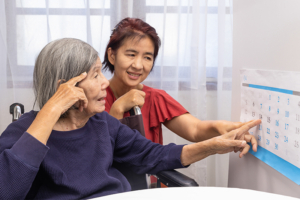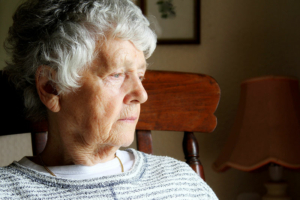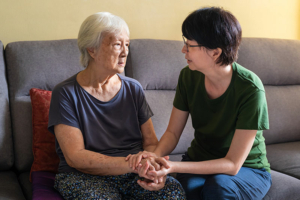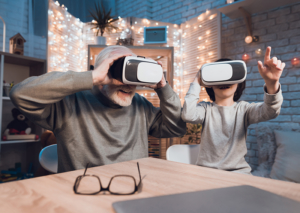
Reality orientation can help loved ones with dementia through confusion.
Did you ever wake up in the middle of a dream and wonder, just for a moment, if what you were dreaming about was real? It can feel very disorienting until you open your eyes and take in your familiar surroundings. An experience like this can give you just a brief glimpse into the ongoing disorientation for a person with dementia. When confusion about time, place, and even identity settle in for a person you love, you’re faced with two options for responding: either stepping into their reality with them, or practicing reality orientation for someone with dementia.
Which Reality Is Best?
In a nutshell, each approach has its place in dementia care. However, there are specific cautions to understand when using reality orientation for someone with dementia. It is important to first understand what is involved with both options and when they could be most appropriate.
Accepting Their Reality
Living in an alternate reality is quite typical for a person in the mid to later stages of dementia. The individual may believe they are a young adult engaged in their previous career (or a different one altogether), with a spouse and young children to look after. Going along with their perception of reality helps them maintain a feeling of self-worth and purpose. It instills comfort and peace, and it is often the recommended approach.
Orienting Them to Your Reality
On the other hand, reality orientation involves providing cues and prompts about the current time, date, and place. Studies have shown that it can improve cognitive functioning, especially when combined with donepezil, and help with some of the more difficult aspects of dementia.
However, reality orientation should be handled gently with compassion, skill, and awareness of the person’s emotional state. For example, if the person asks where their mother is, it could be extremely harmful to respond, “Why, she died 40 years ago! You are 95 years old, so there is no way your mother could still be alive.” In contrast, reality orientation may be effective in ordinary conversations. For instance, if the individual wakes up and asks what day it is, you might respond, “Today is Friday, the day you have your exercise class and then dinner with Steve.”
If the person seems to become agitated or anxious with reality, it’s always best to join them in the perceived reality that feels comfortable to them.
Our specially trained caregivers are pros at knowing how to effectively engage someone with dementia and make each day the best it can be. We utilize imaginative, customized approaches that help with memory, communication, safety, and comfort, while encouraging independence and a sense of purpose and self-worth.
Reach out to us at (954) 486-6440 for more information on our dementia care in Fort Lauderdale, Deerfield Beach, Plantation, and the surrounding areas.









 Everyone goes through good days and bad days, and everyone is entitled to negative thinking or irritability every now and then. If you are caring for an older adult who appears to have fallen into a routine of continual negativity and complaining, there could be a reason for it. It’s worthwhile to explore whether or not a health issue may be the culprit for negative mood changes in a senior.
Everyone goes through good days and bad days, and everyone is entitled to negative thinking or irritability every now and then. If you are caring for an older adult who appears to have fallen into a routine of continual negativity and complaining, there could be a reason for it. It’s worthwhile to explore whether or not a health issue may be the culprit for negative mood changes in a senior.

 Picture for a second how it could feel to struggle with the cognitive obstacles of Alzheimer’s disease. The people who are closest to you are no longer familiar. The words that would roll off your tongue without a second thought are now just beyond your grasp. In fact, the whole world as you once knew it has turned completely upside down, leaving you yearning for a recognizable foothold.
Picture for a second how it could feel to struggle with the cognitive obstacles of Alzheimer’s disease. The people who are closest to you are no longer familiar. The words that would roll off your tongue without a second thought are now just beyond your grasp. In fact, the whole world as you once knew it has turned completely upside down, leaving you yearning for a recognizable foothold.